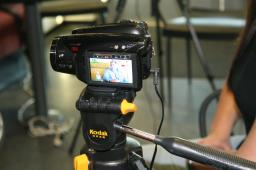- Slug: BC-CNS-Veterans-History, 1st Ld-Writethru,755
- Note: SUBS grafs 8-9 to CORRECT year program began to 2003 sted 2002 and add background on Salt River Project’s involvement. A Cronkite News Service Weekend Special
- Multimedia: Flash video for computers; YouTube video for iPhone.
- With: BC-CNS-Veterans-History-Box
- Photos available (thumbnails, captions below)
By KRISTA NORSWORTHY
Cronkite News Service
PHOENIX _ What sticks with Kevin Kane most from the first time he received a Purple Heart isn’t the explosion that sprayed his arms and legs with shrapnel and left him hard of hearing in one ear. It’s the Iraqi civilians across the street from his crippled Humvee, apparently unconcerned.
“As we were trying to figure out what had just happened, I looked over and these people were just staring at us in line to get gas, like nothing had just happened,” said Kane, who as an Army specialist spent 13 months patrolling Baghdad and training police.
There were plenty of experiences worth forgetting, Kane said, occasionally tearing up. But there also were moments that gave him hope before he returned in 2006 with a second Purple Heart.
“The kids would show us where the IEDs (improvised explosive devices) were and the families would come and bring us gifts like chai tea,” he said.
Taylor Redmond, a sophomore at Cactus Shadows High School in Cave Creek, teared up as well as she helped a teacher record Kane’s story.
It’s one of more than 300 interviews Cactus Shadows students have recorded with veterans from World War II through the Iraq war as part of the school’s Arizona Heritage Project.
“I want kids to hear the real deal. I want them to know this is what war is,” said Barbara Hatch, a history teacher who founded the program.
The oral history project, which Hatch offers as a club, continues an effort Salt River Project started in 2003 as part of its centennial celebration, providing grants for projects exploring Arizona’s cultural influences. Hatch continues the project through her own fundraising.
Cactus Shadows’ Arizona History Project provides videos from the interviews to the Library of Congress. Students produce essays that so far have filled five volumes that are offered for sale and available at places such as the Cave Creek Museum.
“History is living, and if we don’t capture it when it’s living then we lose it forever,” said Evelyn Johnson, the Cave Creek Museum’s executive director. “Most of the veterans that have been interviewed would undoubtedly say, ‘I was just doing my job,’ but heroes are born by just doing their job.”
In addition to sharing veterans’ stories with the public, it’s a powerful lesson for students, Hatch said.
“They can read a book and that is fine, but this experience is much more effective,” she said.
David Hampton, public information officer for the Arizona Department of Veterans’ Services, said preserving stories on video is especially important in the case of World War II veterans, who are dying at a rate of more than 1,000 a day.
“Hearing the actual experiences of veterans in combat is much more meaningful than reading an account by a third person, no matter how good of a writer that person may be,” Hampton said.
Redmond and Hatch recorded Kane’s story during a two-hour session in a student lounge at Grand Canyon University, sipping iced coffee drinks as Kane recounted his experiences.
The student took down basic information about Kane’s background and service and then assisted while Hatch asked specific questions and took pictures.
Redmond said the experience has made her a better writer and given her a unique perspective on war.
“It’s easier to learn history this way; there’s more of a connection,” she said. “He’s telling stories about all the terrible things that have happened. You can easily imagine and not really feel anything about it, but when he is telling it you can.”
Kane said he enjoyed the interview and found it encouraging that students care to listen.
“I think there has been a decline in American patriotism in this generation, and that is something that I hope will change with help from programs like these,” he said.
Col. Thomas Schaefer, who served with the Air Force in the Korean War and as a defense attache was one of 53 Americans taken hostage in Iran in 1979, said stories such as his are important for students because a lot doesn’t get into history books.
“I let the students know that my 444 days as a hostage was the best learning experience of my life,” Schaefer, a Peoria resident, said in a telephone interview. “I also let them know that each and every one of them could have gone through this challenge if they wanted to.”
Hatch said she hopes to start a nonprofit next year to spread the program to schools around the state.
“It is important that we keep this program going because we are losing so many World War II veterans,” Hatch said. “And once they are gone, their stories can never be captured firsthand again.”
^___=
Web Link:
_ Arizona Heritage Project: www.azhp.org
^___=
PHOTOS: Click thumbnails to see full-resolution images.

Kevin Kane, an Army veteran of the Iraq war, speaks with high school student Taylor Redmond and teacher Barbara Hatch (back to camera) as part of the Arizona Heritage Project. The program has high school students interviewing veterans and recording their stories. (Cronkite News Service Photo by Krista Norsworthy)

A video camera records Kevin Kane, an Army veteran of the Iraq war, as part of the Arizona Heritage Project. The program has high school students interviewing veterans and recording their stories. (Cronkite News Service Photo by Krista Norsworthy)